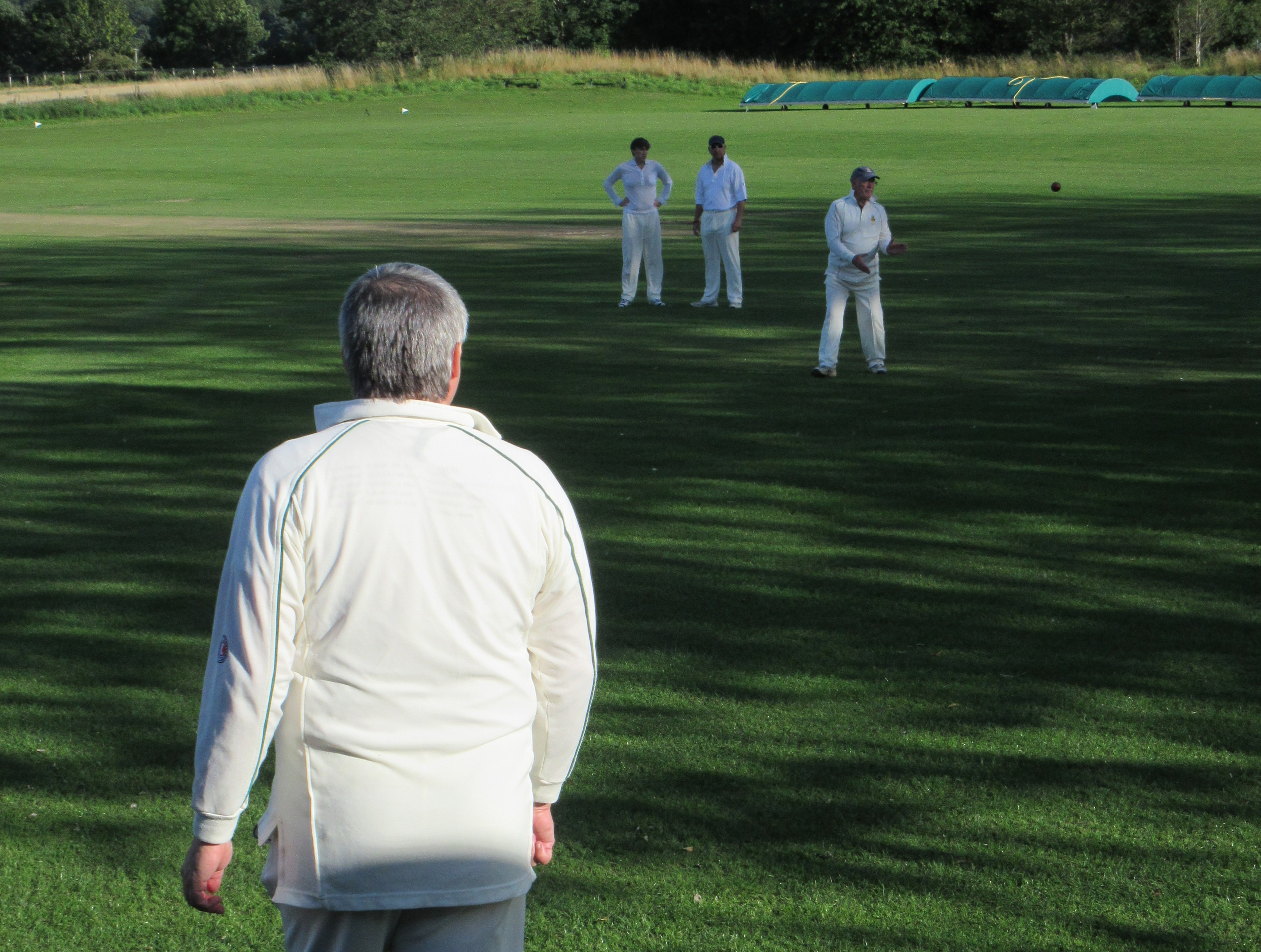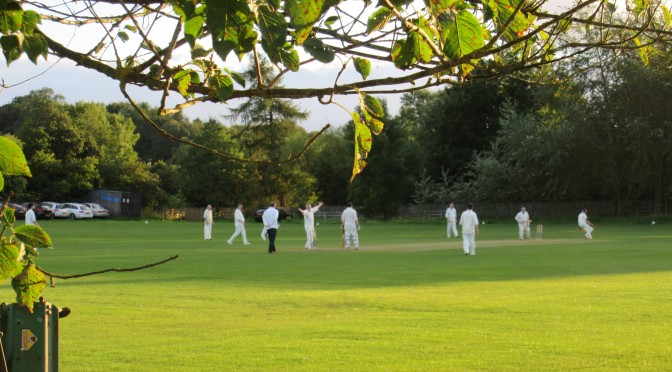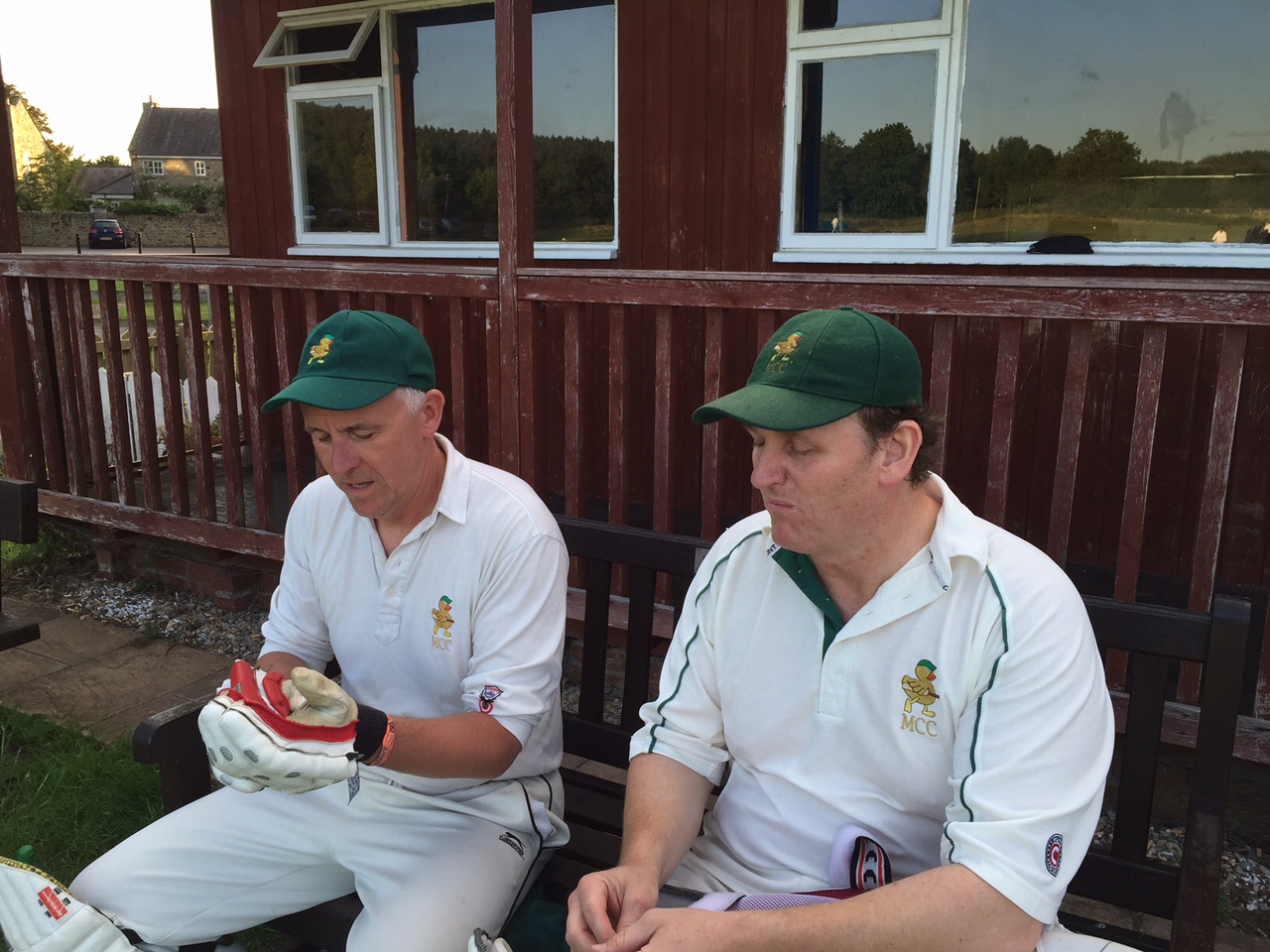‘Why does it always rain on me?’ sang the pedestrian balladeers Travis back in the day. They were of course referring to Bank Holiday Mondays and therefore it was no surprise that this year’s Cricket Festival and BBQ began with it sheeting down.
Travis, however, had never been to Riding Mill – a planned gig in the Wellington having been cancelled when the locals realised who was playing and refused to pay £1.50 a head for tickets. Riding Mill just doesn’t do prolonged spells of rain. The Scottish whiners were also unaware of the Mallards and their associates’ determination to get some cricket in regardless of the wrath of the weather Gods. (The covers, pictured, were handy as well)
The cricket started pretty much on time. Teams were picked in the old schoolboy fashion by the two captains, Wood and Taylor (G) though such choices were made discreetly for fear of undermining the confidence of those chosen last. Despite the weather, 23 intrepid souls had turned up to play in the unique formula of two 15-over innings per team and after winning the toss, Taylor (G) decided that his team, who we shall call the Drakes would bat first.
Things started slowly for openers Hayward and Taylor (D) and after 3 overs it was 11-0. However, with the help of a few wides and byes the score started to mount and after 6 overs the pair had reached 38-0. Hayward was the first to perish, bowled by Watson for 14 but Wilson (R) joined the fray and began by launching a huge six into the adjoining ploughed field. A Jordon over, which included six wides, also saw Taylor became the first batsman of the day to reach the retirement figure of 25 which brought Wilson (J) to the crease. The younger Wilson clearly wasn’t particularly keen on batting with his dad as he trudged very slowly to the crease and then trudged back even more slowly, bowled first ball by Wood. Wilson R’s obvious amusement at his son’s unfortunate demise was perhaps a tad cruel given that he’d clearly passed on his own hapless forward defensive stroke. This left the Drakes handily placed on 67-2 from 9 overs. Wilson senior then joined his son back in the pavilion in the next over, bowled by Gardner for a solid 17 to leave new batsmen Lucas and Scutt at the crease.
Scutt was quickly removed for 6, caught by Cleaver from the bowling of Heslop but Lucas kept the scoreboard ticking over with the second 6 of the innings before he was run out by a Steele/Wood combination for 14. A final flurry from Nitsch, including three further boundaries saw Drakes mount up a healthy 116, including an unhealthy 25 extras.
The Ducks innings began with the Gardners, M and R, leading the battle against the youthful attack of Wilson J and a third Gardner, B. The bowlers held sway with just nine runs coming from the first two overs. Gradually the senior opener, Gardner M, found his touch as the partnership developed and when Gardner R was bowled by Nitsch for 4 the pair had taken the score on to 35 in the 7th over. The senior Gardner retired for 25 soon after to bring Steele and Tedder W to the crease but the latter became the second youngster to perish for 0, bowled in the day’s first and only wicket maiden by the demon McGuinness to leave Ducks struggling on just 48-2 from 10 of their allotted 15 overs.
This brought Tedder senior to the crease and he came and went quickly for 4, surprisingly bowled by Haywood. Steele, who had been progressing serenely, was joined by Buckley as the Ducks finally began to up the tempo. The former finally perishing in the 13th over, bowled by Taylor D for 17.
Buckley, though, was just getting into his stride and finished the innings with a flurry of 4s as 26 runs were added in the final two overs to bring Ducks up to 89-5, Buckley ending on 21 not out, the unfortunate Jordon run out for 6 in the final over run chase.
This gave the Drakes a very nice cushion of a 27-run lead to take into the second innings which followed a swift beer break.
Both teams had agreed to bat in reverse order second time around so this time the Drakes began with Taylor (G) and Cox and again things started slowly, with just 9 from the first two overs. Gradually, however, they picked the pace up with some quick singles and when Taylor was bowled by Steele for 14 in the sixth over they’d reached 33 with Cox approaching retirement. Taylor’s demise saw a minor collapse begin. First Heslop dismissed Gardner B for 2, with the help of a comfortable catch from Jordon. Ducks skipper Wood then took the lead, taking two wickets in two balls, bowling McGuinness for two before trapping Nitsch lbw first ball for 0.
Cox had mostly been watching from the other end but decided enough was enough, hitting Gardner’s first ball for six to retire on 27. But still the wickets fell, Scutt was the next to go for 0, Wood again involved, taking a fine catch at backward square leg from Gardner M’s bowling. The next to go was the doubly unfortunate Wilson J, bagging his second golden duck, bowled by Gardner for 0. Drakes had gone from a comfortable 44-1 to a shaky 54-6 in the space of three overs with Cox also retiring.
All this left Lucas and Wilson at the crease aiming to replicate their form from the first innings, Lucas getting things underway nicely with two fours as Wood’s second over failed to match his first. Jordon’s radar again went a little haywire, sixteen runs coming from his over as Drakes put themselves back on course for victory at 81-6 from 12 overs.
The Ducks hadn’t given up hope though and a comical run out of Lucas, his second of the match, through a combination of Jordon’s boot and Buckley’s quick hands slowed the scoring down. They rallied again when Watson bowled new batsman Taylor D for just 2 (not recorded in the scorebook so I hope that’s right!) but Wilson remained unbeaten on 13, his second solid knock of the game as the Drakes finished on 98-8 and a two innings total of 214, leaving Ducks a hefty target of 126 from their 15 overs.
The Ducks final response got off to a dodgy start when they realised that the barbecue had been flashed up and several of their batsmen tucked into burgers, damaging the large stomachs/quick runs equation.
An unlikely opening partnership of Heslop and Cleaver took to the field and the former was the first to go, clearly distracted by the burger smells, as he was bowled for 0 in Taylor G’s opening over. The Ducks were now going down like a row of, um, ducks. Wood was next to go, after surviving a loud but optimistic lbw shout he was run out for 2 next ball by Nitsch’s surprisingly swift pick up, turn and direct hit. Watson soon followed, for 1, bowled by Gardner B, as the Ducks struggled to 30-3 from 5, the runs almost all coming from the blade of Cleaver.
Wisbach’s arrival finally settled things down and his pair of opening fours meant the chase was back on as they took the score to 53 from just 7 overs before Cleaver retired on 25, a career-best score (although as his career began before the advent of the pen this cannot be confirmed.)
Jordon was in and out swiftly, lbw to Lucas for 1 to bring the Ducks biggest hitter Buckley to the crease with 70 wanted from 7 overs. With the next three overs bringing 24 further runs hope remained but such hope was strangled in the next over, McGuinness bowling Buckley for 13 in what was probably the game’s deciding moment.
Wisbach did his utmost but eventually fell for 24, bowled by Taylor D, and with 36 runs wanted from the last two overs the game was up. There was still time for the comical sight of Tedder Snr being run out by Tedder Jnr for 5, before the latter also perished, bowled by Scutt for 2 as the innings petered out to 103-8 from 15 overs and the Drakes claimed victory by 22 runs.
No man of the match trophy was on offer but a mention in despatches should go to Messrs Taylor D, Cox, Gardner M and Cleaver(?) who all managed to retire not out in one of their innings and to Wilson R and Buckley for two solid innings in a row. On the bowling front, McGuinness’s wicket-maiden stands out but the leading wicket-takers were Wood and Gardner with 3 each, the latter stealing the show with 3-9 from just two overs, suggesting that his captain probably under-bowled him (twice!).
A big thanks to Messrs Taylor G and Nitsch for the organisation and provision of beer and burgers and the vast host of wives, girlfriends, concubines etc who not only turned up to support but in the time-honoured tradition made most of the tea!
Several beers were consumed in the early evening gloom to toast the end of another season and discuss the outgoing captain’s record of played twelve, lost twelve. Follow that Mr Butcher!










